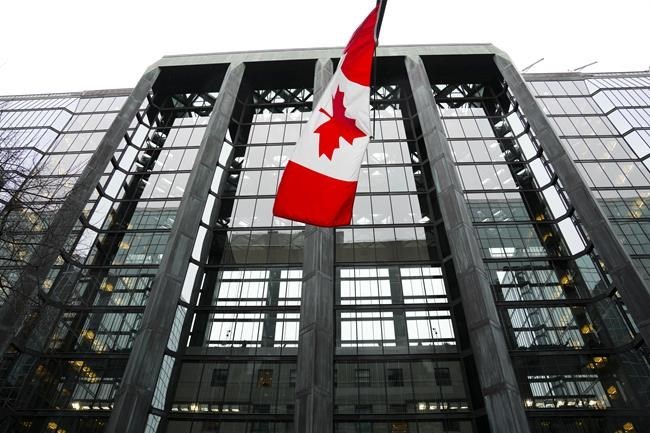OTTAWA — The Bank of Canada is widely expected to hold its key interest rate steady on Wednesday as the Canadian economy bends to higher interest rates and inflation resumes its downward trend.
The central bank held its key interest rate steady at five per cent last month but kept the door open to more rate hikes, citing concerns about the persistence of underlying price pressures.
"Economic data releases since the Bank of Canada opted to forego an interest rate hike in September have been mixed, but we expect that they on net have made a hike at next week’s decision unlikely," wrote RBC assistant chief economist Nathan Janzen and economist Claire Fan in a client note on Friday.
The annual inflation rate rose in both July and August, while core measures of inflation — which strip out volatile prices — have not eased by much in recent months.
But the September consumer price index report helped quell some of those anxieties as the pace of price growth slowed across the economy and the annual inflation rate fell back to 3.8 per cent.
"We were kind of breathing a sigh of relief a little bit after the last inflation numbers," said Andrew Grantham, CIBC executive director of economics.
"The recent inflation numbers suggest that it is starting to decelerate once again. And that, combined with the sluggish growth that we've seen, will probably keep (the Bank of Canada) on hold, not just this meeting, but really for the remainder of this year, and into next year as well."
The Canadian economy shrank in the second quarter. Economists anticipate that weakness will continue for the rest of the year and into 2024.
The Bank of Canada's recent business outlook survey supported this expectation. It showed business sentiment continued to weaken in the third quarter as companies said they expect sales growth to slow over the coming year.
On the jobs front, employment continues to rise as Canada's population keeps surging, but the job market is not as robust as it was in 2022. Job vacancies have fallen and the unemployment rate has edged higher to 5.5 percent.
The pace of consumer spending has also slowed. New retail Canadian retail sales fell 0.1 per cent to $66.1 billion in August as sales at new and used car dealers fell for the month, Statistics Canada said Friday.
These trends are expected to continue as the effect of previous rate hikes take hold on the economy, pinching the pocketbooks of more Canadians and businesses.
In particular, as more households renew their mortgages, the effect of higher interest rates is expected to weigh on more people.
"We know that there's more to come because we know that actually, fewer than 50 per cent of mortgage holders in Canada have been exposed to higher interest rates," said Grantham.
Ontario Premier Doug Ford sounded a similar note of caution in letters he sent to both Bank of Canada Governor Tiff Macklem and Prime Minister Justin Trudeau on Sunday.
The letter to Macklem marked the second time Ford reached out to directly ask the bank to hold off on further rate increases, but Sunday's correspondence focused more explicitly on the effect recent hikes have already had on mortgage costs.
"Every week, I hear directly from families that are paying hundreds or even thousands of dollars more each month on their mortgages," the letter reads. "This
is an additional expense that ordinary families cannot afford, forcing them to choose between essentials like groceries, fuel, and shelter. While you have said that these crushing increases are necessary to combat inflation, that justification is wearing thin."
Ford's letter to Trudeau asked the Prime Minister to work with provinces and territories to address the root causes of inflation.
Most economists expect the current weaker economic and tighter financial conditions to eventually bring inflation back down to two per cent.
And while sticky core inflation is likely still a concern for the Bank of Canada, Grantham expects that concern to factor into the central bank's decision on when to cut rates, rather than whether rates should rise further.
On the international front, the global economy faces some uncertainty amid the Israel-Hamas war, which risks destabilizing the Middle East.
"We're seeing, globally, the risks around inflation have have risen. The conflict in the Middle East, if that escalates, you know, wars are inflationary. There's no other way around it.," Grantham said.
Central banks know all too well what wars can do to prices: the Russian invasion of Ukraine in February 2022 contributed significantly to the initial inflation runup as commodity prices skyrocketed.
Last week, Macklem said it was too early to tell what the economic repercussions of the Israel-Hamas war may be.
“It’s far too early to tell. And it really depends on to what extent … this escalates,” Macklem said.
The Bank of Canada's rate decision will be accompanied by its quarterly monetary policy report, which includes updated forecasts for global and domestic economies as well as for inflation.
This report by The Canadian Press was first published Oct. 22, 2023.
Nojoud Al Mallees, The Canadian Press



